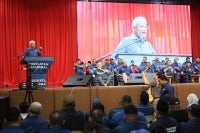War changes economic landscapes

I came across a post by a motivational speaker with thousands of followers who advised people to be cautious in any boycotting campaign.
He said boycotting fast-food restaurants and cafes because their parent companies support Israel would result in local companies suffering losses.
Explaining further, he said these losses would force the affected companies to lay off employees—these employees are our brothers and friends who have financial responsibilities to their families. What about their future? His post received mixed reactions, with many ridiculing and criticising it.
Netizens believe that sustenance and destiny are decreed by Allah and trusting Him was unwavering faith.
To some netizens, while we may be concerned about those who might lose their jobs due to its impact on their families, what about the Palestinians in war-ravaged areas who are starving and deprived of any aid? We lose jobs; they lose lives! Social media brings us closer to the reality in Gaza.
That's why many of us were contributing in our own ways to help our Palestinian brothers and sisters.
At the very least, they were spreading the news they received to friends and family to express their anger against the injustices to humanity.
Many were campaigning for the public to boycott those they knew were supporting Israel's oppression. Many were also urging the people of this country to continue protesting against Zionist oppression.
From a religious perspective, no religious authority has issued a fatwa making it obligatory to boycott or declaring it haram to boycott products or premises perceived to support Israel.
There was also no fatwa prohibiting anyone from working in places where the parent companies support Israel's oppression.
Therefore, it is up to us to consider and decide how to express our opposition in what we consider an appropriate manner.
Meanwhile, those working in business premises or factories linked to Israel can continue working at those places.
However, if the respective companies take action to lay off employees due to financial losses, those employees will have to find alternative employment.
They also cannot blame those who boycotted the companies where they worked until they were laid off because this was a psychological war, and they became collateral damage.
The Israeli Prime Minister's obstinacy indicates that he will continue the agenda to wipe out the population of Gaza. Moreover, voices about the use of nuclear weapons have been emerging recently.
No other major power, whether the United States, Russia, or China, was doing anything to slow down, let alone stop, Israel's actions.
In cities around the world, such as Washington, London, Paris, Berlin, Barcelona, Cairo, Baghdad, Jakarta, and many more, demonstrations were being held every week.
Therefore, the boycott will continue. It will result in losses for consumer product companies in this country, followed by cost-cutting measures and even the closure of some of their businesses.
As the war continues, the boycott will escalate and cover other products like IT equipment, vehicles, and various applications.
The war in Gaza will change the global business landscape.
Prominent global brands cannot boast about dominating the world economy.
If new technological breakthroughs once threatened their survival, now a war to seize a territory spanning 6,000 square kilometres will alter their positions on the world's business map.
Download Sinar Daily application.Click Here!















